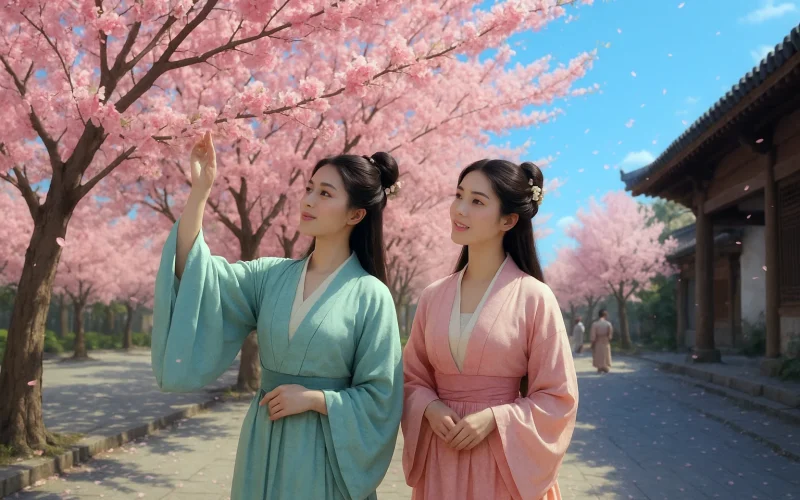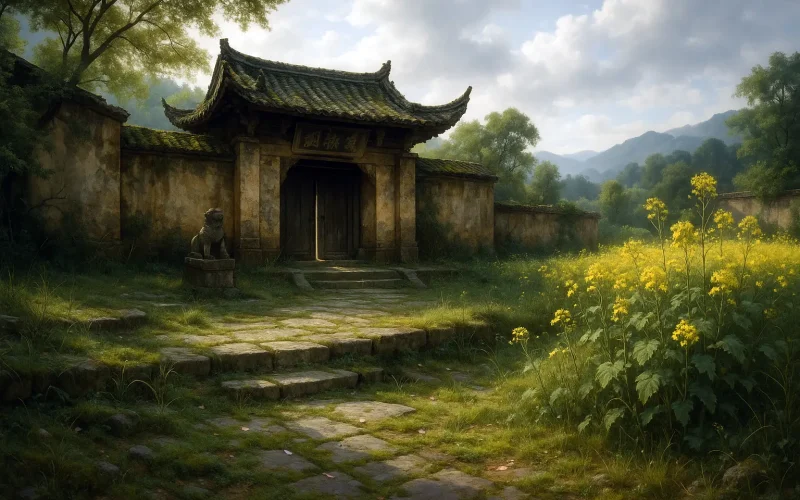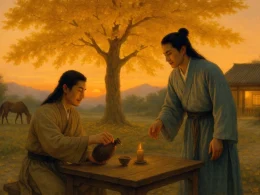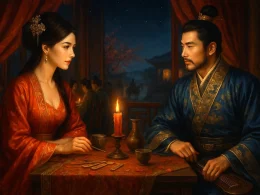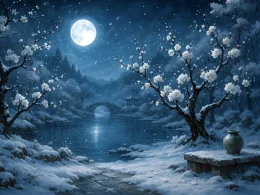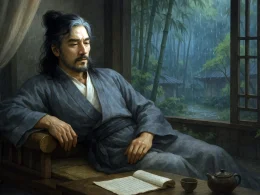Dust raised by cabs on grassy lane caresses my face;
No flower-admirers but follow the cabs' trace.
Thousands of peach trees in the Taoist temple's place
Are all planted after I fell into disgrace.
Original Poem:
「元和十年自朗州召至京师戏赠看花诸君子」
刘禹锡
紫陌红尘拂面来,无人不道看花回。
玄都观里桃千树,尽是刘郎去后栽。
Interpretation:
This poem was written in 815 (the tenth year of the Yuanhe era) after Liu Yuxi, who had been exiled due to the failure of the Yongzhen Reform, was briefly recalled to Chang'an. However, his short return to office did little to improve his situation. Faced with the opulence of Chang'an and the ostentatious display of the wealthy elite, Liu Yuxi used this poem to express his dissatisfaction, subtly criticizing the opportunism and power-hungry nature of the new aristocrats. The poem’s sharp language angered the powerful, leading to Liu’s second exile to Lianzhou.
First Couplet: “紫陌红尘拂面来,无人不道看花回。”
(On the streets of Chang'an, the bustling crowds discuss the return from viewing flowers.)
This couplet paints a vivid picture of the busy streets of Chang'an, where the air is filled with the hustle and bustle of people talking excitedly about their visit to the Xuantu Temple to admire the peach blossoms. The poet delicately portrays the city's vibrant appearance, setting the stage for the subtle metaphor in the following lines.
Second Couplet: “玄都观里桃千树,尽是刘郎去后栽。”
(In Xuantu Temple, the peach trees bloom, all planted after Liu Lang’s departure from Chang'an.)
This couplet shifts from the scenery of the flowers to the peach trees, which, on the surface, describe the natural beauty of the peach blossoms. However, the poet uses these trees as a metaphor for the rise of new aristocrats after his departure. These newly planted peach trees symbolize the opportunistic officials who rose to power in Liu Yuxi’s absence. Through self-mockery and reflection, the poet subtly criticizes the shortsightedness and hypocrisy of the new elites.
Writing Characteristics:
- Emotional Expression Through Scenery: By depicting the lively scene of flower viewing and the flourishing peach trees, the poet creates an atmosphere of leisure, yet underlying this is a deep sense of irony.
- Symbolism: The peach trees represent the new aristocrats, implicitly mocking the superficiality and shallowness of those who rise to power opportunistically.
- Sharp Contrast: Through the comparison of the former desolation and current prosperity, the poet highlights his own tragic situation and his disillusionment with the political climate.
- Concise Language: Rather than directly describing the beauty of the peach blossoms, the poet conveys it through the behaviors and reactions of the people, adding depth to the simple lines, leaving the reader with much to contemplate.
Overall Analysis:
At first glance, the poem seems to be a celebration of the beauty of peach blossoms at Xuantu Temple and the lively flower-viewing scene in Chang'an. However, it contains a deep undercurrent of satire and criticism. The poet uses the flower viewing as a metaphor for the pursuit of power, with the peach trees symbolizing the new aristocrats, exposing the superficiality of the powerful and the cold nature of the world. Through self-deprecation and irony, Liu Yuxi expresses his dissatisfaction with his own fate and disillusionment with the political situation. The poem uses concise and clever language to convey profound meaning, both emotional and sharp, striking at the vulnerabilities of those in power.
Insights:
Liu Yuxi uses the flourishing peach blossoms as a metaphor for the rise of new elites, exposing the essence of power struggles and the constant shifting of personnel behind the façade of prosperity. This poem reminds us that when faced with a world full of superficiality and restlessness, we must remain clear-headed, recognizing the hypocrisy and shortsightedness within power dynamics. At the same time, it encourages individuals to stay committed to their ideals in difficult times and continue to uphold truth in the face of injustice.
Poem translator:
Xu Yuan-chong (许渊冲)
About the poet:
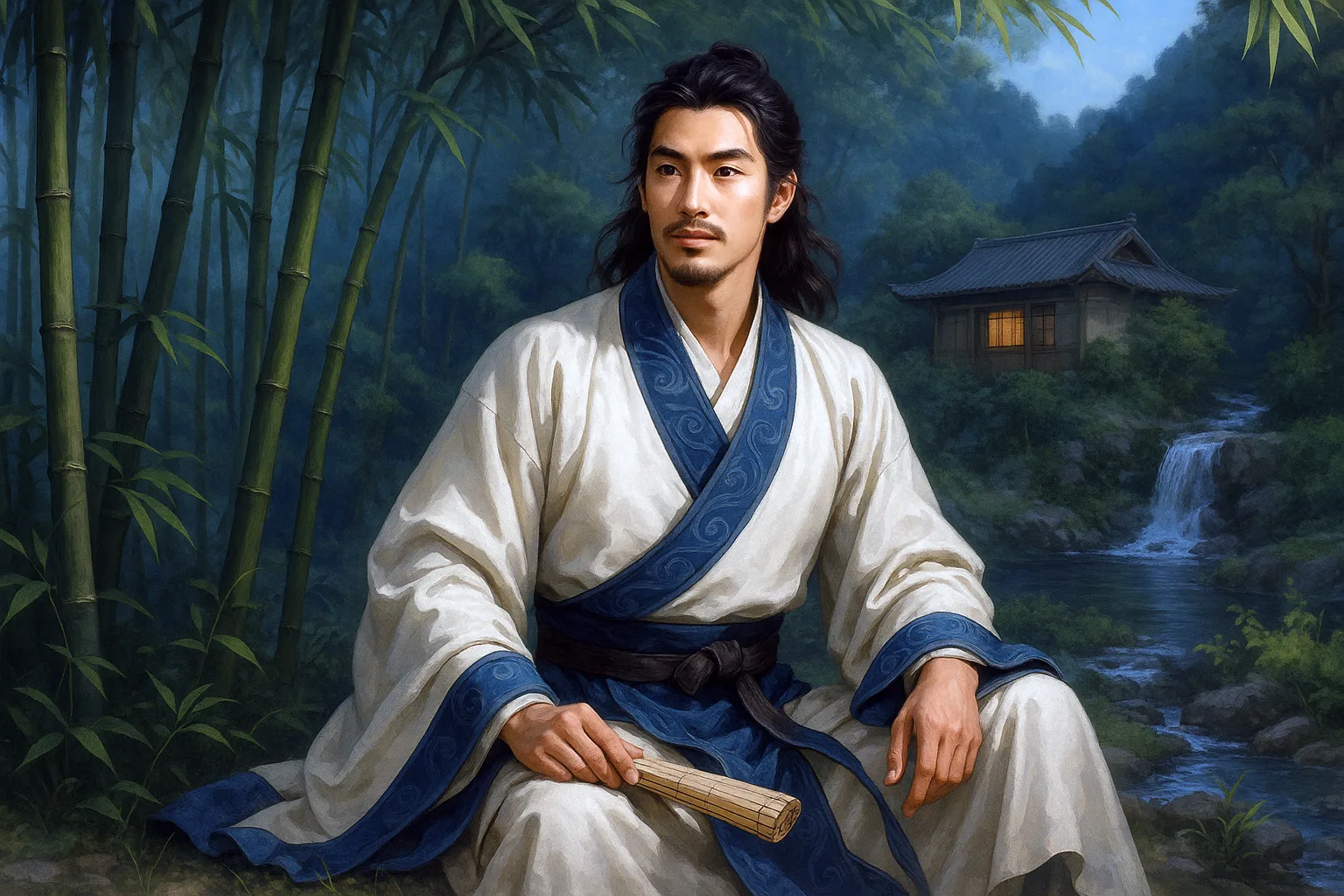
Liu Yuxi(刘禹锡), 772 - 842 AD, was a native of Hebei. He was a progressive statesman and thinker in the middle of the Tang Dynasty, and a poet with unique achievements in this period. In his compositions, there is no lack of poems reflecting current affairs and the plight of the people.






